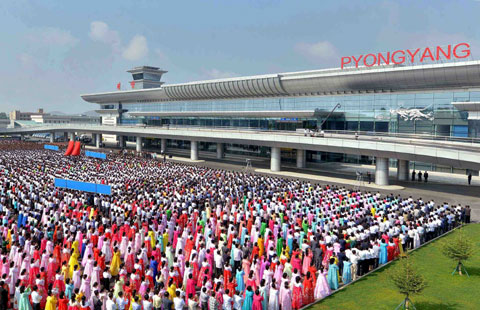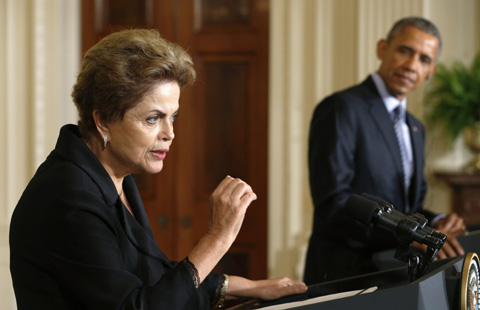Heavy-goods makers' exports up
Updated: 2015-07-02 08:17
By XU WEI(China Daily)
|
||||||||
|
|
|
Wind power generation has seen rapid growth in recent years in the Xinjiang Uygur autonomous region and its wind turbines have been sold to 14 countries. [Photo/China Daily] |
Struggling firms see doors open to Central Asia, Russian buyers
China's national initiative to revive the ancient intercontinental Silk Road trade routes is being welcomed by equipment manufacturers in the Xinjiang Uygur autonomous region, many of which are keen to expand their reach into markets in Central Asia, and Russia.
Formally known as the Silk Road Economic Belt and the 21st Century Maritime Silk Road, and now being referred to simply as the Belt and Road Initiative, the massive development plan along the routes is aimed at promoting the interconnection of infrastructure, and economic and cultural exchanges with neighboring countries.
"It feels like a new road is being directed toward us," said Yang Xuejun, Xinjiang branch manager of Goldwind Science and Technology Co Ltd, China's largest wind turbine maker.
"The initiative will definitely help our exports to those countries," Yang said Goldwind had previously taken a cautious approach toward investment in Central Asia, mainly because many local companies had faced problems in finding the finance needed to expand their operations there.
Established in 1998 in Urumqi, Goldwind had sold 15,000 wind turbines to 14 countries by the end of last year, and had total assets worth 34.4 billion yuan ($5.61 billion).
The company has relied on Europe, Australia and South America for any export growth, with the Central Asian market accounting for just a tiny percentage of overseas sales, despite its geographic proximity.
"If the initiative, especially the planned Silk Road Fund, manages to reach out to these companies and provide them with financial support, we will definitely increase our investments there," he said.
The Belt and Road Initiative could also prove crucial for industrial companies fighting plunging market demand at home, allowing them to redirect excess production capacity overseas, such as Shanqi Xinjiang Automobile Co Ltd, an Urumqi producer of heavy-duty trucks.
Ke Xianzhi, its deputy general manager, said the automaker's sales this year have been hit hard by a slump in domestic demand, and a depreciation of the Russian rouble.
"The initiative has offered a silver lining to our business, as the overcapacity of production within this region seems to be an insurmountable challenge right now," he said.
- Mass casualties in Indonesian military plane crash
- Japan's LDP lawmaker denounces Abe's security policies
- More than 100 feared dead in Indonesian military plane crash
- More than 50 may die in Indonesian plane crash
- Japan's Diet gets 1.65m signatures against security bills
- Thailand's first MERS case declared free of deadly virus

 Western Europe swelters in long-lasting heat wave
Western Europe swelters in long-lasting heat wave
 Top 10 shareholders of AIIB
Top 10 shareholders of AIIB
 Massive Hello Kitty theme park opens to visitors
Massive Hello Kitty theme park opens to visitors
 New terminal of Pyongyang Intl Airport put into use
New terminal of Pyongyang Intl Airport put into use
 Ten paintings to remember Xu Beihong
Ten paintings to remember Xu Beihong
 Obama hails new chapter in US-Brazil relations
Obama hails new chapter in US-Brazil relations
 Boxers top Forbes highest paid celebrities list
Boxers top Forbes highest paid celebrities list
 Not so glamorous: Glastonbury ends with sea of rubbish
Not so glamorous: Glastonbury ends with sea of rubbish
Most Viewed
Editor's Picks

|

|

|

|

|

|
Today's Top News
Economic growth driving force for China's future mobility: Think tank
'Operation duck' and the student savior from internment camp
White House lifts ban on cameras during public tours
China, Canada seek to increase agricultural trade
A Canadian comes to Xi'an, finds personal, business success
Fewer Chinese seek US grad schools
US, Cuba to announce reopening of embassies on Wednesday
China bests MDGS for improved drinking water, sanitation
US Weekly

|

|






